Most Recent Titles click on title label
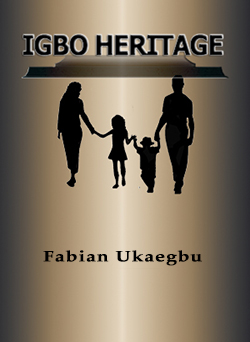
Book Particulars
- Author: Fabian Ukaegbu
- Published: August 20015
- ISBN: 9780992868895
- Pages: 236
- Cover: Paper Back
- Price: £10.99 ( retailed at - www.nedbooks.uk)
Content Summary
Igbo is not dry land, tree or mineral oil. Igbo is the expressed character, conduct and life of the Igbos. When the Igbos slacked; they slump. A music usually danced clothed, if danced naked implies madness. The Igbos should check and review their conduct and approach to justice; the world is not new. Character is the vent of life. If the Igbos do not know how life changed for them, it is that they have lived absentminded of their custom. If it is really about hunger, have the Igbos stopped being hungry and what is making them ever hungry? Who has ever fully satisfied hunger with corrupt and ill-gotten things? If it is about wealth, have the Igbos become wealthier? Is there anything that fills the gap and soothe than custom? Custom defines character, what is Igbo without its customs? When your land becomes infertile of its usual crops signal curse; can the Igbos recognise the arm of nemesis?
Igbo heritage embraces anything Igbo. It is character reference of Igbo. As in defining a people, the characteristics of Igbo include the people, behaviours, customs, relationship, landmarks and environmental equity. As represented in Igbo social structure (The Igbo: The Afrikan Root of Nations chap. 2), Igbo has no earth deity; Chineke is Igbo head and foot; hence, no one does anything and hides away from Chiukwu. Igbo hailing from the seventh generation from Adam is the only race that has complete knowledge of custom from God. Chi1-Chineke -Chiukwu is monotheistically metamorphic and not susceptible to the Trinity, which is for those learning God from Greek Olympiad culture. Chi is not divisible, supplementable or over-reachable. As Chi metamorphosed to Chineke and Chiukwu, Chi develops to any life and growth culture. He is; he made; he rules what he made; this is what man inherited and should be doing as the image of God. Anything that distracts this is evil.
As you would have known, Igbo is the only race that started early to customise and personate Chiukwu. In the oldest written account (the Bible); Igbo emerged from seventh generation from Adam. According to Dr Meek, Igbo was anglicised Hebrew which is nothing without etymological and customary evidence. When Hebrew thoughts were distorted by Greek (331BC-AD325), we took foreign and tend to miss the foundational culture. Greece wrote Lamech (Lemechi) and Adah but Greek etymology has no "ch" and challenged with Adah, it brainstormed to Eve but Adah continued in the lineage of Esau; thus, reminding of struggle to prevail but naturally snake does not swallow another snake. For whatever reason of Igbo confusion and dwindling, a true believer in Chiukwu knows where his strength, might and help come. No people borrow 'Chi' from another people because it is developmental. What we shall see more is when a people go wrong, Chineke removes his face from them. Whosoever God removes his face from is in darkness or hell. Chineke has no replacement. In dealing with Chi/God, what we see or shall see more is as people fiddle or pretend to swallow pig or try to shadow others, often Chineke does not allow his just children to be swallowed; hence, Greece did not swallow Hebrew. We find colonialism in that way; meaning that the approach was wrong. The ancestors expressed this thus: Agbawo Dike Izu; hence, Jacob's taking what belonged to Esau busted ominously to nothing eventually. Who else is like Igbo in the Royal Diadem of Chiukwu? Remember: live and let live is an equitable doctrine. Heritage is invisible; in this work, we shall demonstrate the consequences of wrong population management, poverty, greed and ignorance. No writer has written God before but derivatives of his relationship with generations. Thus, the best for God-fearing generation is to take Chiukwu as bounded rationality, where good or evil is reciprocated equitably.
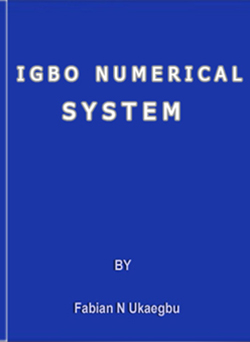
Book Particulars
- Author: Fabian Ukaegbu
- Published: 2010-10-14
- ISBN: 09537667-4-8
- Pages: 236
- Cover: Paper Back
- Price: £29.95 ( retailed at - www.nedbooks.uk)
Content Summary
A nation is a system of thought/ideologies, practices and results. Without own manageable system, a nation is weak and incapable of discharging its duties to its citizens. Numerical system is one of the uttermost secrets of a nation. Earlier, Dibia n?agba afa had known this, but it was not valued until the same or similar system (binary) was used to design electronic system. The binary numbers are 1, 2, 3, 4, 5, 6, 7, 8, 9. They are binary because they are singular and can lead to other numbers, e.g., 10= 1+ 9; 2 x 5; 4 + 6; 11=2+9; 3+8; 4+7; 5+6, etc. This coupling system leads to mathematical combination, progression and synergy. They combine to form the BDMAS (bracket, division, multiplication, addition, subtraction). This is the basic system design and card playing scenarios from which the Analogue systems were constructed. The electronic was simply increasing the velocity and frequency radii. The number system is important in learning nature. For instance, peel an orange and count its brackets, most oranges have ten brackets. Count the fingers or toes of both hands or feet, they provide the basic mathematical tools. Does this apply in any one language and not in the rest?
Remember, our fathers counted with sticks and when they reached peak i.e. 400, they called it nnu and to make one thousand, they counted two bundles of 400 sticks and added half a bundle 200. They said that nnu abuo n?okara was 1000. At least, they knew where they reached, but a few years ago (2001), a man asked his in-law for a bride price of N20, 000. Amongst the negotiation parties were natives, who needed to understand what was said. They asked to be told in Igbo numerical terms, so that they do not float in ignorance of what they came for and should know. This never happened because the youths did not know it. What is N20, 000 in Igbo language?
In the late 1960s and 1970s, my dad indeed, during the farming days when we were cutting and breaking bamboos (achara) for taming yam, told me that nnu abuo n?okara make 1000. In 1992, I raised the issue during his visit that nnu abuo n?okara is not 1000. He laughed and asked me what it is. I told him that nnu is 1000 and 400 is ohu ano. I calibrated the Igbo numbers before him and he smiled. He believed me and said, we never thought further as you did but you need to investigate beyond 1000. I have and putting my outcome below. We need not live in the past and block the path to the future. We need not become abrasive but constructively contributing to the development of Igbo details, what is 1, 000, 000 or 1, 000, 000, 000, 000? Should we learn from Britain to say one million or billion without having its Igbo equivalent? Did we go to school to learn without inward transformation? Why should an educated Igbo person stop at foreign language, how would the local people know what he learnt? Without an attempt to internalize his learning one mocks education? If our learning stops at foreign language, how can the local people benefit and acknowledge what we learned? How will education go round, if we learn about others and do not allow others to learn about us?
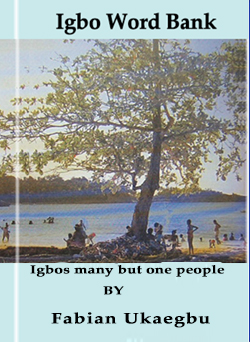
Book Particulars
- Author: Fabian Ukaegbu
- Published: December 2014
- ISBN: 095376673x
- Pages: 150
- Cover: Paper Back
- Price: £10.85 ( retailed at - www.nedbooks.uk)
Content Summary
At a chance, we found that those who claimed to know knew not and are exploited by those who were supposed to know more. The disease of ignorance does not disappear easily instead, its challenges reinforce against its victims. This is because what the community can do no individual can do it alone. The trust and confidence that sustain a nation are not sustained by an individual. Organisation developers believe in change; as individuals live and face death, the need for continuity becomes apparent as implied by Amaechi, Uzoechi, Eziefule or Ahamefule, but who takes over from you must share your custom with you.
If people do not come together, they are scattered as they remain individuals because the bond lacks. Bond, what is it? It is the power of combination to stretch and involve people to their community welfare. Lack of this motivates death because failure to provide community support exposes individuals to danger morally, spiritually or by abuse. He died yesterday, I die today and you die tomorrow, it is the same death but a community could act more proficiently to space out the days. the bond is in language, custom and love. Igbo language is a tool for strengthening the bond.
Wherever people are scattered, it is their pride, disunity and impertinence that characterise their failure. We are now in the era of soul (conscience) searching to find what every Igbo person is doing that is scattering Igbo. Language is a part of custom and Igbo language is a force. Whether spoken in tongue, performed in act or sign; spoken in the North, East, West or South, it is only useful if it spurs understanding and better knowledge.
This work is so brief and concise to save a busy person's time. As named, the work is a test of Igbo language teacher and pupil. As an aid to learning Igbo, it contains the rules of usage. It shows the age of Igbo supported with evidence from Genesis 4 to the last Prophet of the Old Testament (Malachi). In proving that meaning gives power to word, the Igbo words such as Chi-jireh, Ada, Lemechi, Malachi are explained to simplify the understanding of the Bible.
Further, word formation, meaning and explanation are dealt with under alphabets and pronunciation (chapter 2).
The nature of Igbo language as found in its prefix and suffix was the concern of chapter 3.
As in every language, word command and punctuation are dealt with in chapter 4.
Igbo Word-Bank (dictionary) is displayed in chapter 5, the main aim being to persuade a learner to pick words of daily meaning and grow onwards to others.
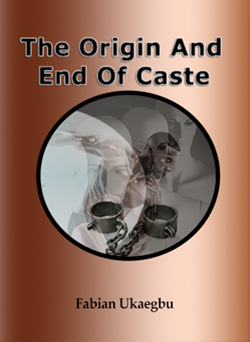
Book Particulars
- Author: Fabian Ukaegbu
- Published: August 20015
- ISBN: 9780992868895
- Pages: 150
- Cover: Paper Back
- Price: £10 ( retailed at - www.nedbooks.uk)
Content Summary
You may have heard of caste, what is it? In custom or law, there needs be a locus standi to treat or justify any issue. This book was invited and addressing wrong or erroneous views on caste, which toughen it beyond its true nature. Caste is not susceptible to psychometric, genetic or scientific tests. It is always rooting, which is customary as in tracing unregistered land title. No one digging for water finding it says that he does not know what it is. What is the root of caste? In law, cause and effect should cohabit. This is what we shall establish because if caste is only a name, it is nothing but the effect is the issue. In caste, cause blends retrospectively in seeking root. So far, every writer on the subject has limited it to social stratification. Such approach numbs the edge in seeking for true origin and/or solution. Inferring from M. A. Beck, social stratification can start at any time but true beginning or origin is very vital to avoid robbing head with tail, which may delay solution.
It needs not be social stratification because every community however organised has social structure with its generic terms, which describe its formation. It needs not be caste motivated because social fixations can break up for one reason of mobility, change in occupation, religion, marriage or extinction. We shall be dealing with origin of caste or outcast which orients from act.
There are castes in Afrika, Asia, America, Australia, Europe and Far East, is caste in the air, infectious, progressive or regenerative; how is it everywhere with unknown root? The UK was stratified at certain time according to the mixture of races, whose backgrounds were not known but when known; laws and policies broke the barriers. From the title, there is a possibility to reserve caste for the castes but one should know causation because it is the cause3 that made caste and even though not called caste to subsequent causes, it remains so from the first caste. If sin causes death; those who live after sin must know what life after sin means and entails. It is absurd to live any life without its root. Instead of geography, study history because history details geography more meaningfully.
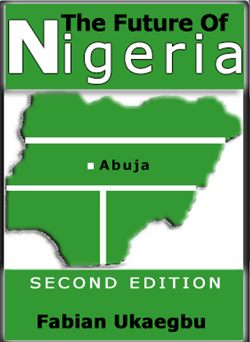
Book Particulars
- Author: Fabian Ukaegbu
- Published: 10-3-2017
- ISBN: 1 858460409
- Pages: 300
- Cover: Paper Back
- Price: £12.95 ( retailed at - www.nedbooks.uk)
Content Summary
There is a very strong misunderstanding existing amongst us all which hinders our unity. I do not know what the cause is really but I think, it is not tribal, linguistic or religious differences, although, these things may have something to do with it, but I think they are not the real causes, it must be 'something else.
The above statement was made by Alhaji Ahmadu Bello at the General Conference at Ibadan in 1950. In addition to tribal, linguistic and religious differences, he believed that 'something else' was affecting the country's unity. Although he did not mention what this is, evidence from the country's fifty-five hard years of independence suggests that this could be innate, upbringing or governmental processes. While the former two may be intrinsic, we shall start from extrinsic one: "governmental processe" to dig to the intrinsic ones.
This yet unknown or unnamed 'something' has followed the country's evolution to thwart all administrative efforts toward unity. Nigeria is admiring democracy and the subtle way Alhaji set out his view calls for inquiries to uncover the hindrance. He said that he did not know possibly because as he did not attend University; what of those who attended, have they identified the missing dimensions in Nigerian unity? Alhaji talked of union in crises from its formation, have the subsequent generations done better to identify and improve on the something? When America pursues a lion, it catches it but Nigeria cannot catch a rat without resolving that 'something' that hinders its strength. Scotland has different currency and religion but is still in the UK
Does true civilisation or mental rationalism hold back or polish up; why seek unity immodestly? In a state where levels of poverty, mentality, greed and creedal differences exist, it would amount to deceit to pretend that unity is achievable without fairness and realistic commitment of all the concerned parties. The issue is that of identifying and establishing the elements and root causes of differences and conscientiously searching out their true solutions. If anything should deter unity, it is the dichotomous1 acclamation, which shifts blames and problems to one side and righteousness to the others in their underlining and unseen visions. The consequence of this purview is the outright injustice of clearing oneself of guilt and condemning others without fair trial. Incidentally, this is not what the world needs in terms and conditions for living together because insane neighbours create moments of worry to themselves. Peace is a compromise among sections. The idea of preferring lies to truth when one stands to gain is the type of injustice that could compound a people with travails and nervous problems. Why should Hausa want to relate with Igbo and Yoruba, vice, versa? Is it for love, cultural harmony or material resources? What is their relationship about?
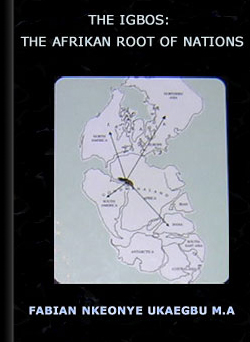
Book Particulars
- Author: Fabian Ukaegbu
- Published: 2014-12-28
- ISBN: 0953766721
- Pages: 536
- Cover: Hard Back
- Price: £29.95 ( retailed at - www.nedbooks.uk)
Content Summary
The evidence is proved beyond reasonable doubt that, America, Australia, China, Europe, Japan, India, Middle East and West Indies developed directly or indirectly from Igbo as traced to the 7th generation from God. A very presumptuous thought provoking statement granted but do have a read.
The Afrikan Root of Nations is the first comprehensive history of the world aside other claims namely, George Buffon and Charles Darwin's aphorisms. This book ends all speculations about the origin of human being. It customarily and genealogically traced the origin of human from the 7th generation from God to date, thereby ending the enigma that had hitherto surrounded the origin of man. It is a ?must-read? for everyone wishing to better his understanding of human being. That the first settlers in India Umu-Chima hailed from Igbo provides the corridor for other settlements in the regions. (Chapter 1).
The society of God is not the same with the society of men, is it? How was the first society made? The Glaciation's effect, how was your colour made? The world is heading towards the fourth glaciations, how will it down on us? The society of men grew out of custom into anarchy, what Social Structure did the world start with? Aside of the Babylonian calendar and Roman Calendar of AD 400, how did calendar start and what was the form of it? Without state craft, civil ordinance, how did mankind survive into the AD 1700s of the Industrial Revolution? What did colonialism undermine and cover in Afrika? (Chapter 2).
Hackbous or Ancient race, what customs sustained the ancient man? Who occupied Afrika and how was it occupied? How did they adapt and metamorphosed into Asia and Caucasian? Did God exist originally in the mind of men or in religion? When a religious people enter judgment against his misunderstood race termed pagans, one would expect something better, how the civilized, religious Europeans aid or impoverish Afrika? Indeed, can one be a good economist and moralist at the same time? We tend to give up under pressure, but what of the faith yield; Mosquito beat us into Sickle Cell disorders, how did AIDS/HIV find us? Polio 40 of the 1940s was a vaccine to treat the effects of the Atomic Bomb. But instead of testing it in the area where the Atomic Bomb had effect, it was tested on people without chemical problem, thus, without justified duty, the vaccine reverted to something else, later termed AIDS/HIV hence, a retrovirus. Afrikans had advanced in ecology before the first European came to Afrika, to suggest that AIDS/HIV, was from dog, monkey, etc, was a fallacy. How did Afrikans become the victims of AIDS/HIV? What is the best treatment for Cancer, Hypertension and Diabetics? Education is a gradual process of learning and development and what purpose does it serve? What type of education was provided to the people who formerly fed themselves that they cannot now ably feed themselves? Custom sustains posterity, can any race survive without sound customs? What customs sustain posterity? Is Circumcision a religious practice? Can the uncircumcised enjoy sex like the circumcised? What is incarnation, does it truly exist and how does it work? What are the three cycles of life? (Chapter 3)
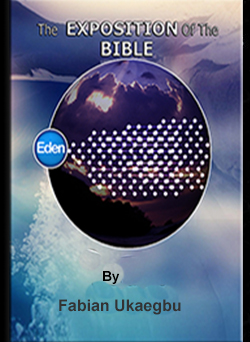
Book Particulars
- Author: Fabian Ukaegbu
- Published: 10-9-2015
- ISBN: 9780956048295
- Pages: 762
- Cover: Paper Back
- Price: £26.95 ( retailed at - www.nedbooks.uk)
Content Summary
The Exposition of the Bible is a cross-link between "The Oxford English-Hebrew Dictionary" (OEHD) and "The Bible". The link is because the facts we need most are coming from the Bible, which has become the hub of many claims chiefly, "Hebrew". What was Hebraic in The OEHD became an issue because what it presented as Hebrew did not represent Hebrew. It is difficult to write a Hebrew dictionary without clear Hebrew alphabets. A Hebrew dictionary for Hebrew readers and learners should contain clear Hebrew letters. Many dictionaries pose difficulties to their users who may not know how the words were formed or adopted. A dictionary being a collection of letters or words should inform the user of the letters, so that he can learn to shape his knowledge, which comes first before developing it further. If a user does not know what a particular letter stands for or its role in a word, it can mislead. One need not be a literary linguist to notice this in some languages. A look at some etymologies that put many letters, consonants, vowels and double consonants after each other; for example, oo; ghgh, shsh, ou.., reveal their inexplicability from start to finish. Wherever people concoct letters to form words or names (person, place or thing), it is spirit that vibrates (Jen.1:3; John 6:63) and to know the meaning of such spirit or word is important as it may be used in conducting covenants, sanctions or Treaties. When anyone claims an existing letter or name, we check his credence, susceptibility and sustainability of it; Hebrew for claim is not the same as belonging, is it?
It is not at all hidden that every language has ample bias and little admiration for another. Let us consider the first celestial union on earth which is in language between mother and child. Is the first cry of a baby: U-w-a-a! U-w-a-a!! U-w-a-a: a lesser expression of its feeling of the world? If one does not know what "u-w-a-a" means, he misunderstands the baby. Some people misjudge this cry but the baby was saying something: "U-w-a-a!" means "this world". This cry marks the beginning of animation or the baby is abnormal but why this cry? Did it cry while in its mother's womb? It enjoyed a private heaven while in the womb. Coming to the open-world is frightening; very open that it easily leads astray. This has been as obvious as providing us a passage into this work. Everyone cries u-w-a-a but everyone has not been able to grow to manage this open-world. The time has come for us to reassess what happened so that we might get it right. The baby's cry alerts its mother, who says: "my child" (Nwam); soon, the pain of labour ebbs. The response by the Midwife is: "welcome"; and we welcome you to the New Era, which springs from this work. What a language expresses is its experience. Racking head to interpret differs from direct expression. Unlike interpreting fiction, which may yield nothing, a successful Welcome interpretation of non-fiction gives rise to something which is checkable; e.g., covenant prohibiting evil or killing; covenant promoting justice, peace and orderliness.
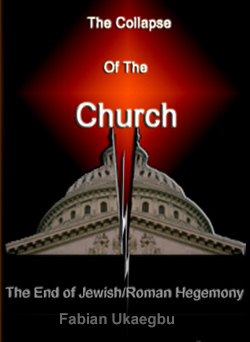
Book Particulars
- Author: Fabian Ukaegbu
- Published: 2007-7-30
- ISBN: 9780953766772
- Pages: 300
- Cover: Paper Back
- Price: £10.95 ( retailed at - www.nedbooks.uk)
Content Summary
Advancing the mission, the master started 2000 years ago; we start this phase (third), from where he stopped because we want to move on. We cannot seek for the unification of the Church without sanctifying the paths. Jesus: The Four Gospels Reconciled and One-to-One with God established; this phase promotes your covenant with God and men to end evil.
Remember, a covenant is a mutual undertaking between you and God or neighbour. It is an agreement because you have a part to play and God or neighbour has his own part to play in achieving the agreed objective. Testimonies arising from this will establish your faith in any relationship. We have finished with the scrambles for membership into religious organisations. We are now into providing real proofs of who is walking with God.Truly, our starting point is where the master stopped, which is: The son of man goes as it is written of him, but woe unto such man by whom the Son of man is betrayed! It had been good for that man if he had not been born.
The purposive version is cursed be he, who did evil or through whom evil is done. Had we cursed evil since 2000 years ago, evil would have reduced or been eradicated. The manner of breaking bread has been consistent , what made The Lord's Last Supper unique was the condition upon it . Before, he gave without condition but during his last supper, he gave with condition. There are two things to resolve. The first is, being not a familiar practice, the miracle of "breaking bread" needs no dilution, so that we can notice when something new happens among us. Secondly, the Lord's Last Supper is pre-eminent, which needs no repeating without its condition. The Master cursed the evil one and wished the good ones to take forward his mission. Thus, we have dual mandate of ending evil and promoting the good mission for the salvation of souls.
The version "Take this and eat, Take this and drink". the church took on is not covenantal, if giving (forbearance) and taking (benefit) is not bound by any agreement to end evil. Take this and eat/drink above is evasive of the faith and truth that went into the covenant that claimed the life of the betrayer before the betrayed. In the last phase, we asked you to take your position at the Lord's Supper table and answer?if you would kill yourself (suicide) if the Lord gave you to eat and drink freely without condition. Remember equitably, Christ started in the city Herod Philip built in affection with Caesar [Caesarea Philippi ] to reveal his fate in Jerusalem. He repeated it several times like the Band of Equity to forewarn evil. Then, on that evening, he made a covenant to end evil, which indeed indicted the evil doer to die before the betrayed.
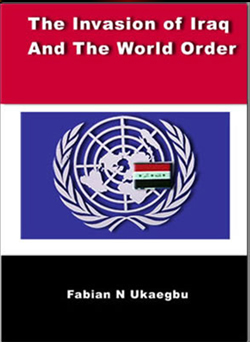
Book Particulars
- Author: Fabian Ukaegbu
- Published: 2014-12-29
- ISBN: 095376675-6
- Pages: 100
- Cover: Paper Back
- Price: £6.95 ( retailed at - www.nedbooks.uk)
Content Summary
History in the main is a record of human activities. This could be in creation, renovation, or destruction. Without man, history will be void. History is about events, impacts and their consequences in time. It is therefore imperative that we (humans) the history recorder, submit our story in an explicit and succinct manner not only for future reference but more importantly, to augment the knowledge-base from which future deliberations can be made with informed choices.
The Coalition Forces attack on Iraq in March 2003 appends to the world-history database like all the other major events gone before. While the poor still suffers, the Coalition Forces can afford to splash $150,000,000,000 on unproductive action. The world population as at 2004 was 6,000,000,000. The quotient of $150,000,000,000 over 6,000,000,000 on a daily basis can keep poverty at bay for more than a quarter of the world's population. This shows that poverty may not be the worst problem facing the world. My friends sponsored my tours to some cities of the world; at each location, I saw different people, signaling that north or south, East or West may not be the problem. What then is the problem? It has to do with humans and their judgments. In the past, volumes of work had been written about environments, systems and materials, this book is not seeking for evidence elsewhere but among humans. What have we done that is turning the world upside down?
This work is divided into three parts. The first is about the fate of Iraq nationally, regionally and internationally. The second part is about the implications of the invasion of Iraq on the World Order including on globalization. The third dwelling on ?where there is life, there is hope? implies that there is remedy to any problem; and in this, the adage: "problem shared is problem solved" brings the intention of the World Order to its greatest test.
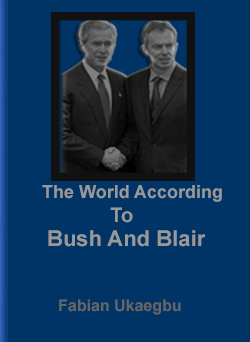
Book Particulars
- Author: Fabian Ukaegbu
- Published: 2014-12-28
- ISBN: 9780953766779
- Pages: 170
- Cover: Paper Back
- Price: £9.95 ( retailed at - www.nedbooks.uk)
Content Summary
Tony or George could be the person living next door to you, the bloke working in the corner shop or the person down the road but in reality they are not. Except you have just come from another planet at this juncture, you must have seen, heard or read about them. The question here is ? Do you really know who they are?
Neither appearance nor knowing the name of someone means that you truly know them. Knowing someone in this context implies that you have an in-depth knowledge of the person. This entails knowing something about their family, upbringing, education, companions and interests. Here is your opportunity to know a little bit more about the two most influential persons in this era. It is important you know the truth in order to avoid prejudicial conclusions. The media and the press by and large have a particular slant to push. And since these in the main are the medium through which the general public access information, that information is very often biased. Tony Blair for instance, is not just a Prime Minister (PM). He was something before and will be something after such post.
By carefully drilling and searching the truth, one might know more to avoid prejudicial conclusion. Having an in-depth knowledge of someone helps (facilitate) to understand his reasons, actions and predispositions. There is no doubt that President George W. Bush and Premier Tony Blair?s biographies exist in various forms. However, one has to question the particular purpose of some of these voluminous and sometimes vacuous undertakings ? imparting knowledge or just money making?
The world according to George and Tony is not a biography nor is it a political analysis of their respective terms in office. It is an unbiased perspective that examines their reasoning and actions in correlation with the norms, morals, ethics and education of their formative years - since all these attributes or traits play an important part of who we are as human beings.




